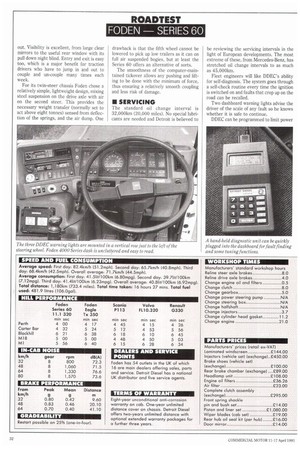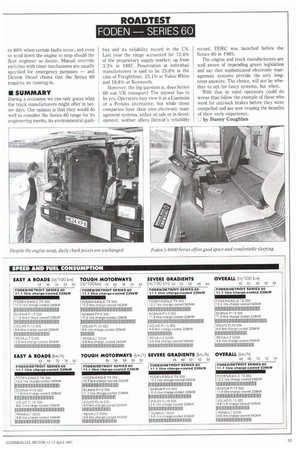ROADTEST FODEN SERIES 60
Page 34

Page 35

If you've noticed an error in this article please click here to report it so we can fix it.
out. Visibility is excellent, from large clear mirrors to the useful rear window with its pull down night blind. Entry and exit is easy too, which is a major benefit for traction drivers who have to jump in and out to couple and un-couple many times each week, For its twin-steer chassis Foden chose a relatively simple, lightweight design, mixing steel suspension on the drive axle with air on the second steer. This provides the necessary weight transfer (normally set to act above eight tonnes) sensed from deflection of the springs, and the air dump. One drawback is that the fifth wheel cannot be lowered to pick up low trailers as it can on full air suspended bogies, but at least the Series 60 offers an alternative of sorts.
The smoothness of the computer-maintained tickover allows any pushing and lifting to be done with the minimum of force, thus ensuring a relatively smooth coupling and less risk of damage.
• SERVICING
The standard oil change interval is 32,000km (20,000 miles), No special lubricants are needed and Detroit is believed to be reviewing the servicing intervals in the light of European developments. The most extreme of these, from Mercedes-Benz, has stretched oil change intervals to as much as 45,000km.
Fleet engineers will like DDEC's ability for self-diagnosis. The system goes through a self-check routine every time the ignition is switched on and faults that crop up on the road can be recalled.
Two dashboard warning lights advise the driver of the scale of any fault so he knows whether it is safe to continue.
DDEC can be programmed to limit power to 80% when certain faults occur, and even to wind down the engine to stop should the fleet engineer so desire. Manual override switches with timer mechanisms are usually specified for emergency purposes and Detroit Diesel claims that the Series 60 requires no running-in.
• SUMMARY
During a recession we can only guess what the truck manufacturers might offer in better days. Our opinion is that they would do well to consider the Series 60 range for its engineering merits, its environmental quali ties and its reliability record in the US. Last year the range accounted for 12,4% of the proprietary supply market; up from 3.3% in 1987. Penetration at individual manufacturers is said to be 25.8% in the case of Freightliner, 23.1% at Volvo White and 18.8% at Kenworth.
However, the big question is, does Series 60 suit UK transport? The answer has to be yes. Operators may view it as a Cummins or a Perkins alternative, but while those companies have their own electronic management systems, either on sale or in development, neither offers Detroit's reliability record. DDEC was launched before the Series 60 in 1985.
The engine and truck manufacturers are well aware of impending green legislation and say that sophisticated electronic management systems provide the only longterm answers. The choice, will not be whether to opt for fancy systems, but when.
With that in mind operators could do worse than follow the example of those who went for anti-lock brakes before they were compelled and are now reaping the benefits of their early experience.
Ll by Danny Coughlan
















































































